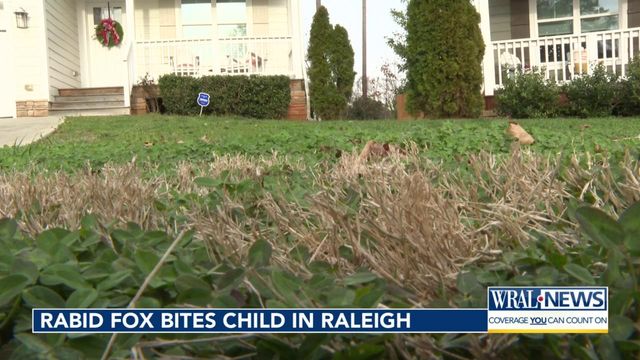Rabies alert: 4-year-old girl bitten by rabid fox in Raleigh neighborhood
Wake County Public Health has issued a rabies notice after a rabid fox bit a 4-year-old girl in a Raleigh neighborhood.
The fox tested positive for rabies after biting the little girl over the weekend outside a home in the 4000 block of Spiedie Court, near the intersection of Western Blvd. and I-440.
The child's father said his daughter was playing across the street when the fox approached the kids and bit his daughter on the leg -- and tried to bite her again on the foot.
The girl's mom was watching the kids from across the street and ran over, scooped her up and took her to the hospital.
Raleigh Animal Control responded, and the fox was euthanized and sent for rabies testing on Saturday, March 2.
At this time, no other incidents have been reported in connection with the animal.
Anyone in the area where the bite occurred who may have encountered the fox is encouraged to call the Wake County Communicable Disease line at 919-250-4462. If you or your pets have been bitten or scratched, please seek medical care immediately.
Construction bringing out more wildlife
Neighbors say the area behind the homes used to be thick woods -- but construction is clearing the trees and bringing out more wildlife.
"In general, animals are coming into neighborhoods more because there's less nature," said Tara Harrison, Associate Professor of Zoo and Exotic Animal Medicine at NC State. "More neighborhoods, more apartments are going more and more into the areas where these animals once lived, so the interface between wildlife and people is being blurred a lot more than it has in the past."
While foxes typically run away from humans, illnesses like rabies can make them aggressive instead.
"Foxes don't generally attack humans unless it's sick, has rabies or something like that." said Harrison.
Wake County Health Director Rebecca Kaufman says people should be aware if wildlife is acting suspicious and take precautions.
"When you're outside with young children or pets, it's important to keep your eyes open," she said. "If you see a suspicious animal, bring your pets and child inside."
Low-cost rabies vaccinations for pets
Wake County encourages anyone who has pets with outdoor access to make sure they are up to date on their rabies vaccinations.
For those seeking low-cost options for vaccinations, microchips and resources for their cats and dogs, Wake County’s Community Pet Days will kick off on Sunday, March 10, and run biweekly through April 21 at various locations across the county. Rabies vaccines are available for only $5.
It's important to have your dog or cat vaccinated for rabies.
What to do if you're bitten by a rabid animal
If you are bitten by a rabid animal, the Center for Disease Control recommends a regimen of "four 1-mL doses of HDCV or PCEC vaccines [that] should be administered intramuscularly to previously unvaccinated persons."
The four doses should be administered on days 0, 3, 7 and 14. The CDC says a fifth dose may be needed on day 28 for people who are immunocompromised.
You can read the CDC's full guidance here.
What to do if you spot an animal that appears rabid
Anyone who sees an animal acting in an unusual manner is urged to call Animal Control officials.
Please follow the guidance below:
- Do not approach animals that you do not know. Exercise caution and maintain a safe distance.
- If you have been bitten or scratched by an animal of unknown vaccination history, wash the wound immediately and seek medical attention.
- Ensure your pets have a current rabies vaccination. If your pet is allowed outside, a booster vaccine is strongly recommended. Keep outdoor pets indoors until they receive the booster vaccines.
- Do not feed stray or unknown animals, including cats and dogs. Avoid any interaction that may result in potential exposure.
- Do not leave trash or food outside unless it is in a trash can with a tight-fitting lid. Prevent attracting wild animals to your property.
- If a pet is fed outside, do not leave food out overnight to minimize the chances of attracting animals that may carry rabies.
- If a pet comes in contact with an animal that might be rabid, contact a veterinarian immediately. Seek professional guidance to ensure the well-being of your pet.
For more information, please check out wake.gov/StopRabies.











